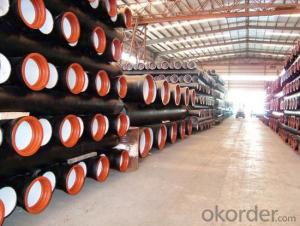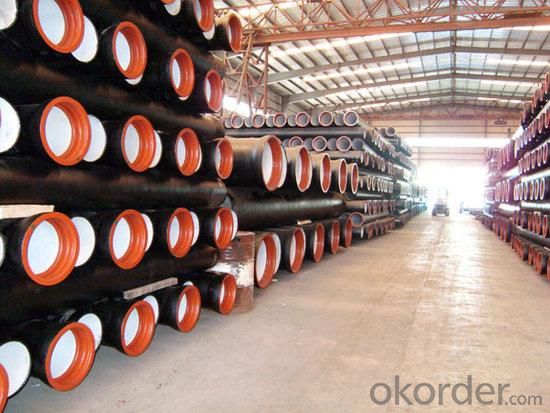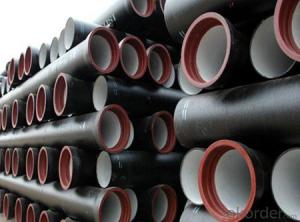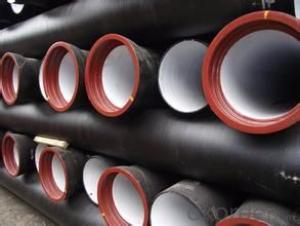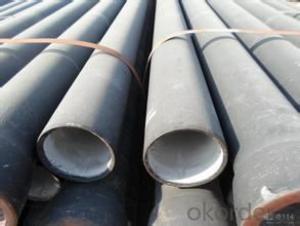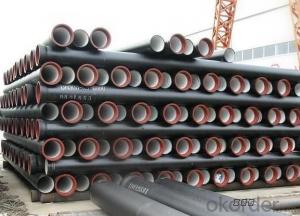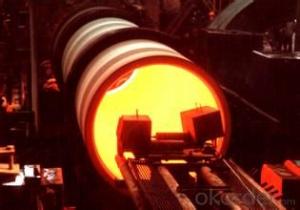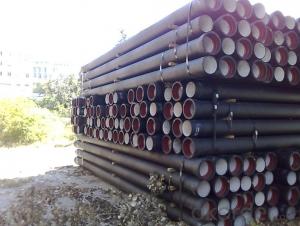Ductile Iron Pipe Standard:ISO2531 Length: 6M/NEGOTIATED
- Loading Port:
- China main port
- Payment Terms:
- TT OR LC
- Min Order Qty:
- 500 m
- Supply Capability:
- 100000 m/month
OKorder Service Pledge
OKorder Financial Service
You Might Also Like
1.Ductile Iron Pipe Description :
DI pipe fittings are manufactured according to ISO 2531 or BS EN545 or BS4772 FOR POTABLE WATER ,internal is cement lining or wet epoxy coating;External is zinc plus bitumen or wet epoxy coating. We also manufacture ductile iron fittings with fusion bonded epoxy both inside and outside. All the producets are sutible to water pipes fields.We have passed ISO9001,ISO14001,OHSMS18001 certificate.
2.Main Features of the Ductile Iron Pipe:
1. Material: Ductile iron grade 500-7/ 450-10 in accordance with ISO1083
2. Standard: ISO 2531, EN545, EN598, ANSI, AWWA
3. Certificate: ISO9001, ISO14001, SGS, NSF, WRAS
4. Test: In accordance with ISO 2531 / EN 545 / EN598 and 100% water pressure test
5. Length: 6m or cut into 5.6m, 5.7m, 5.8m
6. Internal Lining: Cement, conform to ISO4179
7. External coating: Zinc + Bitumen, conform to ISO8179
3.Ductile Iron Pipe Images:
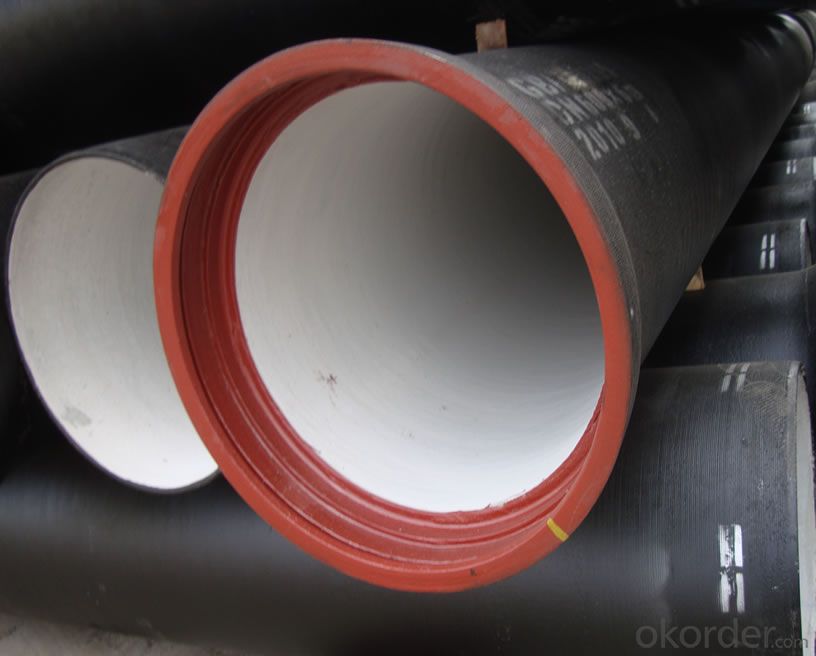
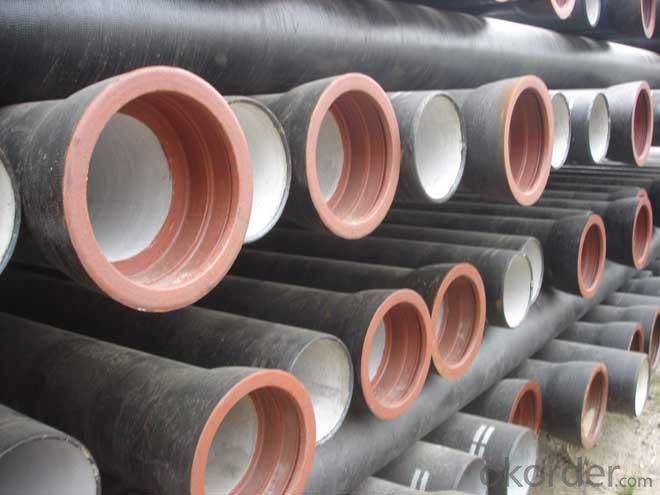
4.Ductile Iron Pipe Specification:
Standard: API SPEC 5L 44th eidtion,ASTM A252-98(2007)
Grade: A53 Grades A/B, ASTM A106 Grades B/C,ASTM A179
AWWA, C200, ASTM A139, ASTM A120, API 5L Grade B
X42, X52, X56, X60, X65, X70, X80, X100
Weld Alternatives: LSAW
OD size range: 6.4~44.5mm
Wall thickness: 406.4~1422mm
5.FAQ:
1.Q: Why would you choose ductile iron pipe rather than other pipe materials?
A:The reasons are obvious for that not only ductile iron pipe possesses the inherent strength and flexibility of ductile iron, combined with proven corrosion protection systems, but also the cost savings can be achieved from design to installation and commissioning.
2.Q:Why can you guarantee the inner of pipes can’t be corroded?
A: High alumina cement mortar lining and sulphate-resistant cement mortar lining. These two special linings are applicable to inner anti-corrosion for sewage pipes, improving resistance to erosion of the sewage components.
- Q: Are ductile iron pipes suitable for power plant applications?
- Yes, ductile iron pipes are suitable for power plant applications. Ductile iron is a type of cast iron that has enhanced strength, durability, and flexibility compared to traditional cast iron pipes. These properties make ductile iron pipes ideal for power plant applications where they are exposed to high pressure, extreme temperatures, and corrosive environments. Power plants often require a reliable and robust piping system to transport various fluids such as water, steam, and chemicals. Ductile iron pipes have high tensile strength and can withstand high pressure, ensuring the safe and efficient flow of these fluids within a power plant. Their ability to handle high-pressure steam makes them particularly suitable for power generation applications. Additionally, ductile iron pipes have excellent resistance to corrosion, which is crucial in power plants where many fluids can be highly corrosive. The internal and external linings of these pipes protect them from corrosion, ensuring a longer service life and reducing maintenance costs. This corrosion resistance also makes them suitable for transporting chemicals and wastewater within a power plant. Another benefit of ductile iron pipes is their ability to withstand extreme temperatures. Power plants often operate at high temperatures, and ductile iron pipes can handle these conditions without compromising their structural integrity. They have a high melting point and can resist thermal expansion and contraction, making them suitable for applications involving hot fluids and steam. Furthermore, ductile iron pipes are cost-effective compared to other materials commonly used in power plants, such as stainless steel or carbon steel. They offer a balance between performance and cost, making them an attractive choice for power plant applications. In conclusion, ductile iron pipes are well-suited for power plant applications due to their strength, durability, flexibility, corrosion resistance, and ability to withstand high pressures and extreme temperatures. Their cost-effectiveness further adds to their suitability for power plant piping systems.
- Q: Can ductile iron pipe be used for wastewater treatment plants?
- Ductile iron pipe is indeed applicable for wastewater treatment plants. This material is robust and long-lasting, displaying resistance against both corrosion and abrasion. Given the severe and corrosive conditions commonly present in such facilities, ductile iron pipe is frequently chosen. Its exceptional hydraulic performance further enables efficient and effective transportation of wastewater. Moreover, the simple installation and maintenance process of ductile iron pipe make it a practical preference for wastewater treatment plants. Ultimately, ductile iron pipe proves to be a dependable and economical alternative for wastewater treatment purposes.
- Q: What are the meanings of cast iron pipe wall thicknesses LA, A and B respectively?
- According to its manufacturing methods can be divided into: sand, centrifugal pipe, straight pipe, continuous cast iron pipe and sand pipe.According to the material used, it can be divided into gray iron pipe, nodular cast iron pipe and high silicon iron pipe.1 、 water supply cast iron pipe:The use of cast iron cast iron water pipe of No. 18 above by adding nodulizer, after centrifugal ductile cast iron pipe by centrifugal casting machine, the performance of ductile iron pipe with nature, iron and steel, excellent corrosion resistance, good ductility, good sealing effect, simple installation, mainly for municipal, industrial and mining enterprises water, gas, oil etc.. Water supply pipe is the first choice, with high cost performance.2 、 sand casting centrifugal cast iron pipe:The sand casting centrifugal cast iron pipe is made of gray cast iron. It is suitable for the transportation of pressure water such as water and gas.
- Q: What is the expected deflection range for ductile iron pipes?
- The expected deflection range for ductile iron pipes typically falls within the range of 2-5% of the pipe's diameter.
- Q: How are ductile iron pipes repaired if they get damaged?
- There are several methods available for repairing ductile iron pipes, each dependent on the severity of the damage. Below are some commonly used techniques: 1. Spot Repair: When the damage is minimal and localized, a spot repair can be performed. This involves removing the damaged section of the pipe and replacing it with a new one. The new section is typically connected to the existing pipe using mechanical couplings or flanged connections. 2. Pipe Lining: If the damage is more extensive but the pipe remains structurally sound, pipe lining is a suitable option. This method entails inserting a liner into the damaged pipe, creating a new smooth surface. Various materials like epoxy or cured-in-place pipe (CIPP) can be used as liners. The advantage of this technique is that it eliminates the need for excavation and complete replacement of the pipe. 3. Pipe Bursting: In situations where the pipes are severely damaged or deteriorated, pipe bursting may be the most optimal solution. This process involves pulling a new pipe through the damaged one, simultaneously fracturing the old pipe and substituting it with a new one. Pipe bursting is typically employed when the existing pipe is irreparable and necessitates complete replacement. 4. Welding and Patching: In certain cases, small leaks or cracks in ductile iron pipes can be rectified through welding or patching. Welding involves melting and fusing the metal to seal the damaged area. Patching, on the other hand, involves applying a specialized epoxy or composite material over the affected section to create a watertight seal. It is essential to consider factors such as the extent of the damage, accessibility to the pipe, and the proficiency of the repair crew when selecting the appropriate repair method. Regardless of the technique chosen, a thorough assessment, meticulous planning, and skillful execution are necessary to ensure a successful and long-lasting repair.
- Q: How can the ductile iron pipes be treated with corrosion protection?
- Epoxy coal tar coatingThe epoxy coal tar coating is not only suitable for gas pipelines, but also for sewage pipes. It is a two component coating with a high adhesion and a very smooth surface
- Q: How does ductile iron pipe handle soil movement?
- Ductile iron pipe possesses exceptional strength and durability, making it highly effective in managing soil movement. When the surrounding soil shifts or settles, ductile iron pipes can flex and adapt to this movement without compromising their structural integrity. The ability of ductile iron pipes to handle soil movement stems from their inherent capacity to endure bending and stretching. They have a remarkable level of flexibility, allowing them to adjust to ground shifts and settle without experiencing any breakage or cracks. This flexibility arises from the distinctive material properties of ductile iron, a type of cast iron that has been treated with magnesium to enhance its strength and elasticity. Furthermore, ductile iron pipes are constructed with a thick wall, which enhances their resistance against soil movement. This robust construction assists in distributing the forces exerted by the shifting soil, minimizing the impact on the pipe and preventing significant damage. Moreover, ductile iron pipes are typically installed with suitable bedding and backfill materials to provide additional support and stability. This involves using compacted soil or engineered granular materials around the pipe, which helps evenly distribute the load and reduces the potential for soil movement. Overall, ductile iron pipe is an excellent choice for areas with high soil movement, such as regions with expansive or unstable soils. Its flexibility, strength, and proper installation techniques enable it to effectively handle the challenges presented by soil movement, ensuring long-lasting and dependable performance in various applications.
- Q: Are ductile iron pipes available for cutting and are there any relevant specifications?
- You can cut, there should be no specification requirements, as long as you can use, in line with the needs of the project can
- Q: How are ductile iron pipes connected or jointed together?
- Ductile iron pipes are typically connected or jointed together using various methods such as flanged joints, push-on joints, mechanical joints, or restrained joints. These methods ensure a secure and leak-free connection between the pipes, providing a reliable and durable pipeline system.
- Q: Can ductile iron pipes be used for rainwater harvesting systems?
- Certainly, rainwater harvesting systems can utilize ductile iron pipes. Renowned for their robustness and resilience, ductile iron pipes prove to be fitting for a range of purposes, including rainwater harvesting. These pipes exhibit exceptional resistance to corrosion and are capable of withstanding considerable pressure, thereby ensuring the efficient conveyance of rainwater from the point of collection to storage tanks or distribution networks. Moreover, their impressively long lifespan diminishes the necessity for frequent replacements, rendering them a cost-effective option for rainwater harvesting systems.
Send your message to us
Ductile Iron Pipe Standard:ISO2531 Length: 6M/NEGOTIATED
- Loading Port:
- China main port
- Payment Terms:
- TT OR LC
- Min Order Qty:
- 500 m
- Supply Capability:
- 100000 m/month
OKorder Service Pledge
OKorder Financial Service
Similar products
Hot products
Hot Searches
Related keywords
